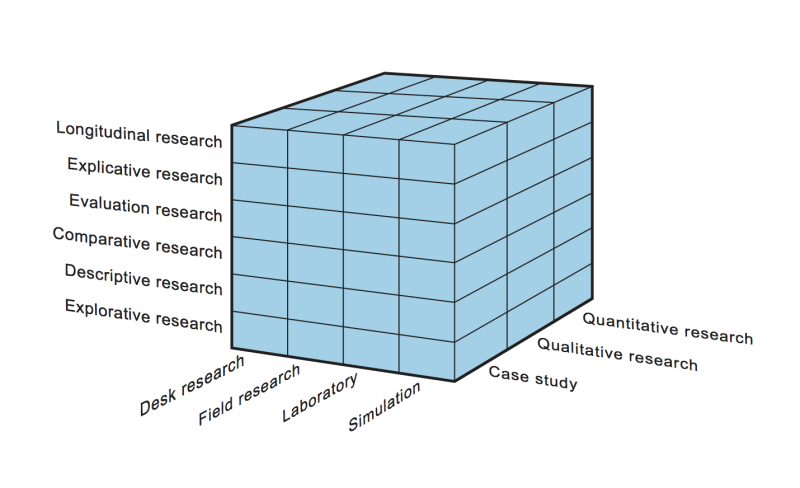- Quantitative research
- What distinguishes quantitative research from qualitative research
- Is there a breaking point between qualitative and quantitative research?
- Is there a preference for qualitative or quantitative research?
- And what about quantitative values?
- Related topics to Quantitative research
- These manuals will guide you efficiently through your research:
- Mission

Quantitative research
Quantitative research is a research with a lot of respondents, objects, organisations or cases.
What distinguishes quantitative research from qualitative research
In a lot of textbooks authors find it hard to distinguish quantitative research from qualitative research. In my opinion this is easy. Just look at the number of objects or respondents. If it is only one, the research should be denoted as a case study. If only a few respondents or objects participate in the research, it is a qualitative research. If a lot of respondents, or objects participate in the research - say over 30 - it is a quantitative research. Solely the number of participants makes the difference.
Then why do authors argue that in qualitative research new theory is developed and in quantitative research a theory is tested? I really do not know. Developing and testing theories can be done with both types of research. Besides that, theories are visions or ideas. It is a cognitive process and has nothing to do with research methodology.
Then why authors do argue that qualitative research is explorative and quantitative is confirmative? Again, I really do not know. Nowadays a lot of information is gathered and analysed. It is called big data. It is not a small quantity and all kinds of data can be part of the database. So explorative research can be done with many respondents as well. And confirming a theory can be done with only a few respondents.
Then why do authors argue that with qualitative research a better insight is gained in the relationship between all the aspects than in quantitative research? I really do not know. If the argument is that more aspects could be viewed in qualitative research, then use these aspects too in quantitative research. Quantitative research does not have an upper limit of aspects for a research. If the argument is that qualitative research discovers more relationships between the aspects, this might be a kind of prejudice or superficial too.
Then why do authors argue that in qualitative research open questions and interviews are used and in quantitative research closed questions and surveys? Now this argument makes sense, but it is based on the numbers of respondents or objects. Have you ever tried to analyse open questions for 50 respondents? Every single answer will probably show a tiny little bit of difference that makes it hard to find the essence, to make a general statement or to draw a conclusion based on these answers. Scientists, who see themselves confronted with such data, classify the answers and start counting them. Now they are even able to divide the data between groups of respondents so this gives more insight too. If the response is large enough all kinds of statistical techniques can be used. And take notice of this aspect too: interviews can be done with a lot of persons, and a survey can be done with only very few respondents. But it is problematic to analyse the data of open questions for many people, and it is strange to send a survey to just a few people. Therefore usually open questions are used in interviews with a few people and closed questions are used in a survey for a lot of people.
Is there a breaking point between qualitative and quantitative research?
If the difference between qualitative and quantitative research merely depends on the number of cases, then when does qualitative become quantitative research? Where is the breaking point?
According to me the breaking point is gradual. Up to ten respondents it is not a (too) big problem to analyse the data. Ten respondents however are not enough to apply statistics. A change in an answer of one person has an effect of 10% change in the total. One hundred respondents will give a more stable result. For most statistical analysis a normal distribution is assumed. Statisticians state that with a response of thirty a normal distribution can be assumed. So, if a breaking point should be mentioned, then it is somewhere around 30.
Is there a preference for qualitative or quantitative research?
Is quantitative research better than qualitative research? No. Then, is qualitative research better than quantitative research? No. Both types of research have their pros and cons. They are both needed for acquiring knowledge about the empery. Depending on the research question, sometimes a qualitative research is prevalent, sometimes a quantitative research. Always try to find the best way to answer the research question.
Finally, if the population is too small, only a qualitative research can be applied. Do not worry, there is nothing wrong with that.
And what about quantitative values?
Some students think they are dealing with quantitative research when numbers are used. Using numbers however is not a guarantee that a quantitative research is performed. A number is a quantitative value, but it might be qualitative data. For instance, if in an interview the member of the board says the turnover of the company is € 10.000.000 it is nice to know. Although it is a number, it cannot be used for calculations. No mean can be computed or a standard deviation. This number is a pure qualitative datum.
Qualitative data can be given numbers. In a survey the answers to a multiple choice question like Where do you study? are usually numbered starting with 1 for the first alternative. Though it is a number now, it is still is a qualitative datum. A 1 might mean in the library, and 2 might mean at home. Again, only the number of participants or the number of participating objects are indicative for dealing with a case study, a qualitative research or a quantitative research.
Related topics to Quantitative research
These manuals will guide you efficiently through your research:
- How to formulate a good research question
- The statistical test procedure
- How to find the correct statistical test
Research can be divided into three dimensions: 1) the research design, 2) the location of data collection and 3) the number of cases. Together they form the research cube.




